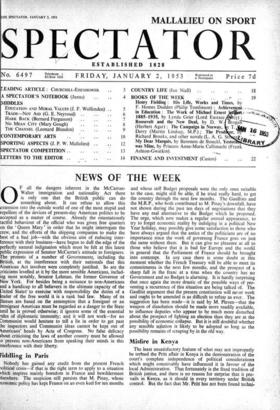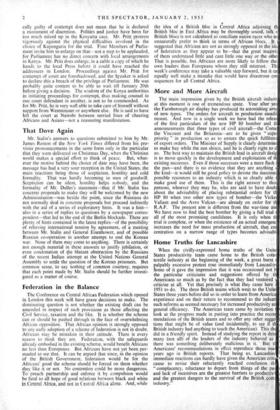Misfire in Kenya The least unsatisfactory feature of what may
not improperly be terIned the Pritt affair in Kenya is the demonstration of the court's complete independence of political considerations which might conceivably have influenced it in favour of the local Administration. That fortunately is the fixed tradition of British justice, and there is no reason for surprise that it pre- vails in Kenya, as it should in every territory under British control. But the fact that Mr. Pritt has not been found techni+ cally guilty of contempt does not mean that he is declared a monument of discretion. Politics and justice have been far too much mixed up in the Kenyatta case. Mr. Pritt protests vigorously against the physical difficulties involved in the choice of Kapenguria for the trial. Four Members of Parlia- ment invite him to enlarge on that—not a step to be applauded, for Parliament has no direct concern with local arrangements in Kenya. Mr. Pritt does enlarge, in a cable a copy of which he hands to the local Press before it could have reached the addressees in London. Proceedings against Mr. Pritt for contempt of court are foreshadowed, and the Speaker is asked to declare this a breach of the privilege of Parliament. He was probably quite content to be able to wait till January 20th before giving a decision. The wisdom of the Kenya authorities in initiating proceedings for contempt, thus making,counsel in one court defendant in another, is not to be commended. As for Mr. Pritt, he is very well able to take care of himself without support from Westminster or anywhere else. He is said to have left the court at Nairobi between ,serried lines of 'cheering Africans and Asians—not a reassuring manifestation.































 Previous page
Previous page